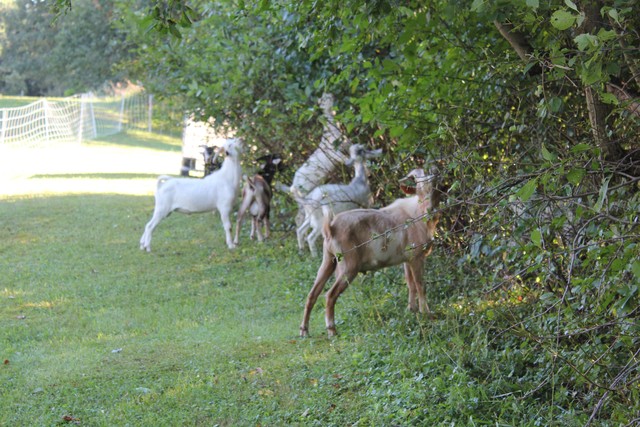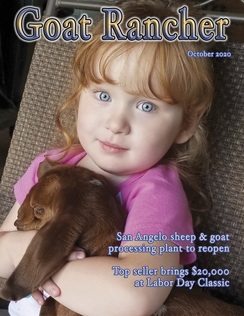Uncertainties with Covid-19 and Food Scarcity this Season
Thursday, October 1, 2020
This year is surely shaping up to be one for the books. It is hard to imagine that anyone will forget the events that unfolded at the turn of 2020. Covid-19 originally brought about many uncertainties and continues to do so today. The unpredictability of the virus has hurt and even closed many businesses. As we are operating a business, we too, contemplated how the virus would affect this year's breeding stock and meat sales.
In past years, customers piqued interest around March and April, when kids are first hitting the ground. March and April rolled around and we had no calls, nor emails, indicating any interest in this year’s kid crop. It seemed people were tightening their wallets, so no purchases of goats, to make sure they could make ends meet while COVID had taken their jobs. While we understood, it made us a bit anxious considering we had our biggest crop of kids on the ground to date. I am happy to say, however, that the wallets did not stay cinched tight for too long. Customers were just a little slower in showing interest this year. We sold all of our doelings, and only seven bucklings left that are destined for processing in November. We also just emptied our meat freezer, of all of our USDA private-labeled goat meat, due to customers buying meat like it is going out of style, for the first time!
These precarious times allowed us to develop the business from a different lens and look at alternative ways to make a little cash, given initially there was limited interest in breeding stock this year. This year we’re having a go at goatscaping! We goatscape every year on our farm and have heard various stories of other businesses like this out West that helps homesteaders combat local fires, so we figured why not try taking it to other farms and homes locally. And so far, hopefully not jinxing it, it seems to be going very well. If you haven’t heard of the term goatscaping, it is the natural and organic way to rid areas of noxious weeds and brush.
What initially started as a test on another local farm has turned into the perfect way to market our new business. Seven of this year’s bucklings were sent to the local barber’s farm where they began doing a bit of goatscaping. We have known this hairstylist for years and she’s always had animals on her farm, whether it be pet goats, pigs, horses, or chickens. Just recently all of her animals, except two roosters, a hen, and a pig, had crossed the rainbow bridge. One day while my mom was getting her hair trimmed, they began talking about our thoughts on this new business and how we were unsure of how to get it up and running. She offered to let us test things out on her farm, which turned out to be a blessing. She had a steep overgrown bank that led to a stream she hadn’t seen in years. We tasked the seven bucklings with clearing that bank and unsurprisingly, had it cleared in a week.
This test on her farm ended up being a perfect way to market the new business too. As she had traffic to her shop every day, people were seeing the goats working the land and asking questions about why they were there. With business cards in hand, she was able to give our information to those interested, which has caused an influx of business for us, both in the goatscaping realm, but also in terms of meat sales and breeding stock sales. While we found we can’t charge quite as much as those businesses we have seen down south or out west, it is still a pretty penny for a week’s worth of goat food. On one such occasion, we had discussed prices with a couple, and they decided after some deliberation that it would be smarter in the long run just to buy goats from us, instead of renting them out, as they were planning to start their herd the following season. Either way, it has ended up being a win/win for us on several occasions.
Another win/win for us has to do with food for the goats. Unfortunately, this year’s fields and hay are terrible all over the state. We went for a month without rain, which is very unusual for Maine, at the beginning of the growing season. This caused the grass to grow very slow. Most farmers in the state were working their first cut fields when they would normally be doing their second cut. The quality and protein of the hay are also lacking. The goats have been on our pasture and woods since about June, but even with rotation, there is not much left as everything is having a hard time growing. By starting this new endeavor, however, it cuts the number of goats on our land, giving our fields and woods time to heal and grow again, and also allows the other goats being rented out, access to new greens and protein every week.
With new areas to eat every week, these goats are getting fat (I use that loosely) and happy. We made the strategic decision to rent out our bucklings that were destined for the market on these plots. It was an easy decision to move these goats around as they were originally the smallest and the ones we needed to pack on the most pounds. It works out largely in our favor to be moving these goats around; and that all comes down to food for them and cost-cutting for us. Our meat is USDA labeled. The claims on our label note our meat is 100% forage-fed, free ranged, no added hormones, and not grain-finished. Then there needs to be an alternative protein source that allows these animals to gain weight. In this case, that’s forage. Allowing these animals to move from property to property gives them access to new protein daily, helping them to pack on the pounds, and satisfying the claims on our label. We are very excited to see mid-November how this summer rotation has worked for the bucklings in comparison to years in the past where the market bucklings have solely been on our pasture and woods.
The last factor that has allowed us to easily expand this endeavor is how easy it is to set everything up. On our farm we are all about making things easy for us, so as not to become a hassle, rather it is a break from our regular work when we spend time with the goats. We have a goat tote on our farm truck that we can easily load the goats to and from. We use Premier One Temporary Fencing and a solar charger to electrify the netting. The goats get a couple of five-gallon buckets of water. And that’s it. On occasion, we will put a small shelter in the enclosure if there is nowhere to get out of the elements. The elements, however, have not been a very big issue this season as we aren’t getting any rain! The goats mind the fence well, and as long as they have food, never test the netting. For next season we are considering a Livestock Guardian Dog to move with this herd as they are off our property without protection.
While Covid-19 has put a damper on businesses in many senses, it has worked in our favor. The virus has pushed us to look for new ways to bring in additional cash not originally anticipated, as well as, provide us a cheap way to ‘beef’ up our boys who head to the market in the Fall. In the coming years, we will surely be employing this method. We already have people interested in getting on the list for next year. I am very excited to see where this business leads us!
(Josh and Kathy Crise, and their grown children, Amelia and Kevin, operate Marble
Creek Acres in Lee, Maine. For interest in a future year’s Kiko waitlist, questions or if you
have topics you might like to read about in a future Goat Rancher, we can be reached at
207-619-3758, email [email protected] or marblecreekacres.com)



